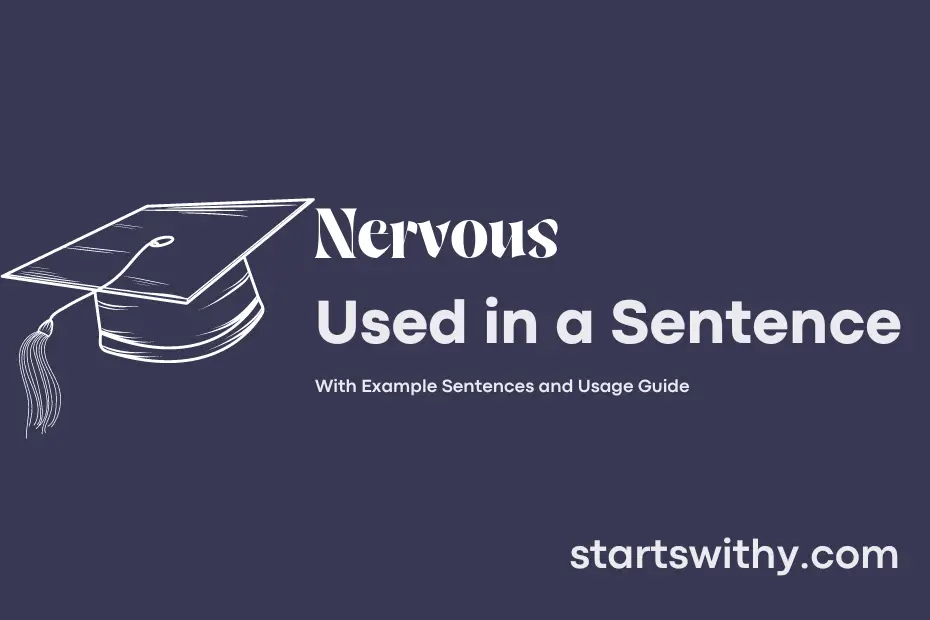Have you ever felt uneasy, anxious, or worried about something upcoming? This common feeling of nervousness is a natural response to stress or anticipation of an event, big or small. It often manifests as butterflies in the stomach, sweaty palms, or racing thoughts.
When you’re nervous, it’s your body’s way of preparing for a perceived threat or challenge. This response can vary in intensity and duration depending on the situation. Learning to manage and understand your nervousness can help you navigate through challenging moments with ease and confidence.
7 Examples Of Nervous Used In a Sentence For Kids
- I felt nervous before my first day of school.
- My friend looked nervous when she had to give a speech.
- The loud noise made the kitten feel nervous.
- I get nervous when I have to take a test.
- The dark room made me feel nervous.
- My brother gets nervous around large crowds.
- The thunderstorm made the little boy feel nervous.
14 Sentences with Nervous Examples
- When I have to give a presentation in front of the whole class, I always feel nervous.
- Before taking an important exam, many students start to feel nervous about their preparation.
- Meeting new people at college can make some students feel nervous and unsure of themselves.
- Applying for internships can be a nervous process as students worry about rejection.
- As the deadline for submitting assignments approaches, students can start to feel nervous about completing them on time.
- Nervous anticipation can set in the night before a big campus event or festival.
- Speaking up in class discussions can make even the most confident students feel nervous.
- Participating in extracurricular activities for the first time can leave students feeling nervous about fitting in.
- For students preparing for job interviews, the nervous energy can be overwhelming.
- Asking a professor for an extension on an assignment can make some students feel nervous.
- Taking on leadership roles in college clubs can lead to nervous jitters for some students.
- The thought of approaching a crush on campus can make even the most outgoing students feel nervous.
- Asking for help from classmates or professors when struggling with coursework can be a nervous experience.
- Sending out job applications and waiting for responses can leave students feeling nervous about their future.
How To Use Nervous in Sentences?
Nervous is an adjective that describes a feeling of worry, anxiety, or unease. When using nervous in a sentence, it is important to understand its meaning and how it can be applied in different contexts.
Here are a few tips on how to use nervous in a sentence:
-
Describing emotions: You can use nervous to describe someone’s feelings before an important event or when they are unsure about something. For example, “She felt nervous before her job interview.”
-
Physical symptoms: Nervous can also be used to describe physical symptoms that accompany feelings of anxiety, such as sweating, trembling, or a racing heartbeat. For instance, “He was so nervous that his hands were shaking.”
-
Behavior: When someone is nervous, they may exhibit certain behaviors like pacing, biting their nails, or avoiding eye contact. You can say, “The speaker was visibly nervous as she addressed the crowd.”
-
Influence on actions: Nervousness can affect a person’s actions or decisions. For example, “His nervousness about flying prevented him from booking a plane ticket.”
Remember to consider the context in which you are using nervous to ensure that it accurately conveys the intended meaning. With practice, you will become more comfortable incorporating this word into your writing and conversations.
Conclusion
In conclusion, sentences that convey nervousness often exhibit signs of anxiety, hesitation, or unease. These sentences may feature trembling, stuttering, or a lack of confidence in their tone and content. For instance, “She nervously played with her hair during the interview,” highlights a physical manifestation of nervousness, while “He stumbled over his words when presenting his project,” shows a verbal display of unease.
Overall, sentences containing the keyword “nervous” tend to depict a state of apprehension or worry. Recognizing these cues in writing can help convey emotions effectively and allow readers to better understand the characters or situations being described. By using such language intentionally, writers can effectively communicate the complexities of human emotions in their narratives.



